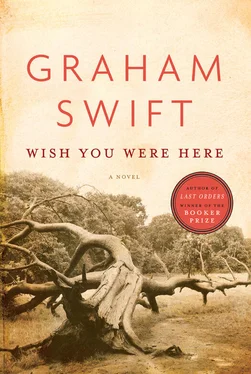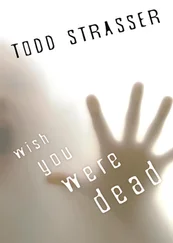For a while, after that, it was like nothing so much as a wedding. He had to sit right at the front near the aisle, near the coffin, like a waiting groom. Eyes were on his back, he didn’t know how many eyes, but he felt it was all right that he didn’t turn, it was all right, it was even the correct thing, to keep his eyes to the front. Were the eyes behind him thinking he was like a bridegroom too? Were some of them thinking: Where’s Ellie?
It seemed now impossible that the coffin before him was the same coffin that he’d watched yesterday being carried off a plane and that had been flown all the way from Iraq. That it had come all that way and by such a remarkable chain of events and arrangements, to stand now quietly here. There seemed no connection. There was no sign of the connection (he hadn’t noticed — in his not-looking — any Union Jacks) and no one so far had made any mention of it, so that it seemed there might be some silent communal effort around him to make it not exist. As if Tom had died, at a tragically early age, just a little distance away. A tractor accident, perhaps.
But then Brookes had got up and said, among other things, that they all knew why they were here and they also all knew why Tom was here, though he hadn’t been here, some people would know, for a very long time. He’d been in other parts of the world. But he didn’t want to talk about how Tom Luxton had died and what he’d died for, because this wasn’t that sort of occasion and other people had spoken of those things and might still speak of them. But what he wanted to remember, as he was sure others here would want to remember — as some of them really could remember — was ‘the boy who was born in Marleston’.
That was what Brookes had said: ‘the boy who was born in Marleston’. Though he might have chosen to say (and Jack knew why he didn’t) the boy who was born at Jebb Farm. It wouldn’t have been true, of course. It wasn’t even true that Tom had been born in Marleston. Didn’t Brookes know? He’d been born in a maternity unit in Barnstaple. And nearly killed his mother in the process. It was Jack who’d been born in Marleston, Jack who’d been born at Jebb. Jack who was really the boy—
But he’d known what Brookes had meant. He had the medal in his jacket pocket. He didn’t know any more clearly now, if he’d known at all, why he’d brought it all this way. It wasn’t Tom’s medal. It went with one of the names on the memorial outside — or you might say with two of them. But his hand went, as Brookes spoke, to the small, round solidity against his chest.
Then Brookes had stopped talking and there was a hymn and a prayer or two, and then this whole part of it was over and it was time for the thing that was the most important thing for Jack, that was really why he was here. He had to go forward now with the five men whose hands he’d shaken and be their leader, even while they, in a sense, would all carry him. Just as they would all carry Tom. He would have to walk with Ireton on the other side and Tom between, facing the congregation now, facing the whole lot of them, but it would be all right if he didn’t smile, it would be all right if he didn’t look anyone in the eye. This wasn’t a bloody wedding. It would be all right if he didn’t show anything in his face, which came quite naturally to him anyway. He would have to be both like and not like one of those six soldiers yesterday. He should have shaken their hands too. He would have to walk, a finite number of paces though he would never count them, with his cheek against the coffin, his shoulder against the coffin, these parts of him closer to Tom than they would ever be again, feeling, sharing Tom’s weight.
And so it was. They emerged through the porch into the painful brightness of the November morning. Behind them the congregation began to file out and follow, but it was as though, Jack thought, the church might have turned into a great grey empty-bellied plane. For the first time now, since he was looking straight towards it, Jack couldn’t avoid seeing the same exact line of hills, across the valley — Dartmoor in the far distance — that could be seen from Jebb Farm.
It wasn’t difficult, as a physical task, it wasn’t so difficult. Ireton was a big man too. He felt the whole thing might be on a backward tilt, and that would be tough on the two at the back. But then the downward slope in the churchyard corrected that. And it wasn’t heavy. Though Tom had been a big man, like his brother. Was it because of the distribution of the load among six? Or because—? What was inside? He knew how his mother had died, he knew how his father had died. His brother’s death was a mystery. He suddenly wanted, needed to feel the weight of his brother. It seemed that, with his cheek and one palm pressed against the wood, he was urging Tom to let him feel his weight.
It was a matter of perhaps twenty steps now, a steadily diminishing number of steps. Jack could see the opening of the grave before him, see, close by, but didn’t want to look and so see the names, the gravestones of his parents, and, yes, he felt sure at last that he could feel, inside, through the wood, through his cheek, through his hand, on these last steps, the shifting, swaying, appreciative weight of his brother. He would be all right now, he felt sure, so long as this weight was on his shoulder. He wanted it to be there for ever. And with each last pace he said now, inside, ‘I rocked you, Tom, I rocked you.’
MICHAEL LUXTON died instantly. The double cartridge-load of shot that passed through the roof of his mouth, then through the back of his head, smashing and impelling outwards everything in between, might as well have been, at that absence of range, a single solid bullet. It continued to pass, along with fragments of bark, skull and brain, some significant distance into the oak tree against which he’d been leaning. It could be said that the tree felt nothing. The tree never flinched and no more registered Michael’s death than Michael did himself. For an oak tree that big and thick and old, to have a parcel of compacted shot and other matter embedded not even deep in its flesh was of no importance. Trees endure worse mutilation.
But the hole, some three feet or more up the trunk, remained, its aperture reduced but defined as the bark grew a ring-like scar around it. It was there when Jack, with five others, lowered his brother’s coffin into its grave. It’s there now. The surrounding stain on the bark remained too, despite that sluicing down on the day itself by PC Ireton. Unlike the stains on the ground, which soon disappeared, it weathered gradually and came to look like some indeterminate daub of the kind sometimes seen near the base of trees, or like some fungal blemish associated with that odd puncture in the trunk. What was it there for? Had someone once tried to hammer something, for some strange agricultural purpose, into the wood?
Of course, Jack knew how it had got there, and a few other involved parties would have been able to explain, very exactly, its cause. But to any outsider or newcomer to Jebb Farm — and there would be newcomers — the hole would have been a puzzle, if not a very detaining one.
One person who certainly knew how the hole was made was Ellie. She and Jack stood one warm July day under the tree — it was the summer after Michael’s death — and Jack watched Ellie put her finger into the hole. He didn’t stop her. He’d done it himself, though not at first. It had taken a long time, in fact, before he’d felt able to and even then he’d felt that he shouldn’t. But it was a hole that, all other considerations apart, begged to have a finger put in it, even two. An ignorant outsider, who might not have been especially bothered by the mystery of the hole, would have found it hard to resist putting a finger in it. By the time Jack returned to Marleston to bury his brother, quite a few fingers, young and old, had been idly poked into that hole.
Читать дальше








![Питер Джеймс - Wish You Were Dead [story]](/books/430350/piter-dzhejms-wish-you-were-dead-story-thumb.webp)



